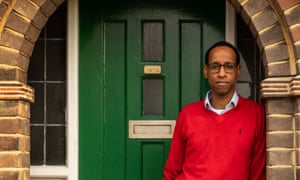Raising the bar: Hashi Mohamed’s journey from child refugee to top lawyer
He defied a life of poverty and hardship to reach Oxford and become a barrister. Now Hashi Mohamed has written a book which aims to rethink the stalled project of social mobility
• Read an extract from Hashi Mohamed’s People Like Us
• Read an extract from Hashi Mohamed’s People Like Us
Hashi Mohamed is a 36-year-old barrister. He has the accent, a mentor once told of him, of someone who’s “been to Eton” and the confidence of a natural orator. If you had to place him within the complex matrix of the British class system, you’d probably say he was the son of wealthy Africans who attended an independent school and Oxbridge.
In fact, Mohamed is a Somali who was born in Kenya, where he lived in a rundown part of Nairobi with his four siblings (another having died), his mother (who also had six children from a previous marriage) and his travelling salesman father. When his father died in a car accident in 1993, Mohamed and three of his siblings were sent to England as refugees.
They lived with an aunt and then in various low-rent housing, some of it rat-infested, and were eventually reunited with their mother. A confused and alienated boy, he spent most of his teen years in a state of geographical and psychological dislocation. He went to a struggling comprehensive in north-west London where the headteacher was beaten up and laughed at, but he eventually managed to get a place at the University of Hertfordshire to study law and French.
From there he was awarded a postgraduate scholarship to Oxford, gained a position at No5 Chambers, noted experts in planning law, became a successful barrister, an accomplished public speaker and a broadcaster – he’s made two well-received documentaries for Radio 4. And he’s just written a book. To complete the picture of all-round achievement, he recently bought a house for himself. It’s in Wembley, not far from where he went to school. And that’s where I go to meet him.
He greets me with a big smile and a polite request that I remove my boots, before making tea and talking me through his story. Even in bare outline, Mohamed’s is an impressive tale, but he turns it into something much larger and far more resonant in his finely written memoir, People Like Us. The subtitle of the book is What It Takes to Make It in Modern Britain, which sounds like a how-to guide to success. In a sense it is, as Mohamed proffers advice from his own experience. But it’s also a rather ambitious and far-ranging attempt to rethink the whole stalled project of social mobility.


No comments:
Post a Comment